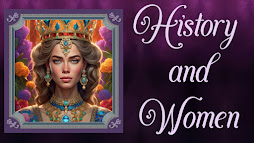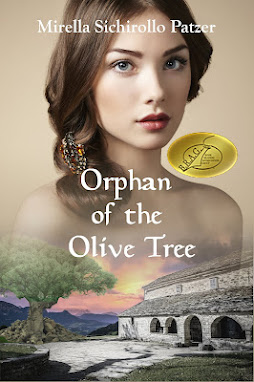Those Scandalous Etruscan Women
Those Scandalous Etruscan
Women
By
Barbara Lambert
Author
The Whirling Girl
If there were a
prize for getting unfairly bad-mouthed in ancient history, Etruscan women would
likely win hands down. The Greeks and later Romans said terrible things about
them: lascivious, lewd, sybaritic, totally out of control. Imagine! Etruscan
women “attended banquets” where they “sat under the same blankets as their
husbands!” – a behavior that had them compared to hetairai (basically courtesans or prostitutes: the only women allowed
at Greek parties). Even Aristotle
tut-tutted.
Not only did Etruscan wives scandalously
go out in public -- and entertain lavishly, wear glorious jewellery, indulge a clothing
sense that is recorded in frescos, statuary, and the bronze mirrors etched with
sometimes rather racy scenes that give us fascinating detail of how fashion
changed down the centuries – but they also learned to read and write. (We know
the danger of that!) They were rumored to raise
their own children, too. Presumably
passing along the dire literary habit.
Before
the rise of Rome as a super power, the Etruscans ruled almost the whole of
Italy. Their ships dominated the surrounding seas. Fearsome enough, as news of
them spread abroad, without the added queasiness of hearing how Etruscan society
accorded women influence and power.
Hard to say where
this all started. With Tanaquil? Who used her soothsaying powers to persuade her
Etruscan husband, Lucius Tarquin, that he could become the first Etruscan king
of Rome?
Or
maybe the bad rap began with Tullia, her successor, who arranged a series of
murders to keep the dynasty in the family -- finally convincing her husband that
her own father should be murdered, then publicly driving her chariot over his
body to make sure. This ruthless streak was passed along to the third of the Tarquin
kings, Tarquin the Proud, whose son finally brought down the dynasty with the
infamous “rape of Lucretia”. After that, the Etruscan Tarquins were driven from
Rome, and a Republic was established.
Granted,
the Tarquins turned out to be an overbearing lot (though responsible for any
number of remarkable advancements in the Rome). But surely it’s unfair for the
whole of Etruscan womanhood to be tainted by their extremes.
One of the reasons
that the Etruscans, in general, gained a reputation for libertine excesses is
that none of their literature survives. Their enemies got the last word in,
literally. At least, until archaeology came along to tell a different story.
We know, now, that women in Etruria were
accorded dignity and respect, right across the spectrum of family and public
and religious life. And speaking of those children, whom so scandalously they
“raised”, there are many statues, carvings and ex-votos, large and small,
showing images of women not just raising, but breast-feeding their children – images
so like Medieval and Renaissance depictions of “Madonna and Child” that it’s
hard not to wonder at their influence on the great masterpieces of later
Italian religious art.
So yes, they loved to party – but even
in lavish “elite” tombs, their favorite things to take along to the after life included
loom weights, spindle-whorls, and much further evidence of dedication to the home
based industries that made such a major contribution to their society’s
commercial wealth.
Still, they were scandalous, these Etruscan women. They rode horses (shockingly,
“astride”, as recent analysis of a female skeleton has affirmed); some even had
their own chariots (discovered buried with them in their graves); and unlike
Roman women who had no names of their own (but were known just as their fathers’
daughters or their husbands’ wives) Etruscan women passed on both name and rank
to their children, along with distinct legal rights. Not only did they own their
names, but they had a distinct sense of ownership
of their bodies – as excavation of Etruscan “healing sanctuaries” has revealed,
where miniature bronze or terracotta reproductions of the most intimate female
body parts have been discovered, along with other votive offerings.
No wonder they were tut-tutted at. What
a threat they truly must have seemed, to other “decently ordered” cultures of
the ancient world. Across society at large, their like was not seen again till modern
times.
And
even now – ah, even now!
But
that is another story.
Visit Barbara Lambert!
 |
| From History and Women |


















Post a Comment
1 Comments